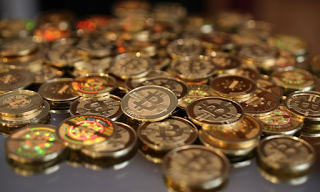At one stroke, there is a new asset class which is an easily divisible store of value. A decade since the "global financial crisis" in 2007, everyone from analysts to market commentators (to people who actually know what they're talking about) have been pondering what will end the quantitative easing (QE) fuelled rescue package? Apart from the moral hazard, the madness of ultra-low interest rates and the injustice of savers receiving next to nothing, it was always known that short-term step back from the abyss was the equivalent of knowingly stepping on a plane with no landing gear. Of course, we have also had all the factors which were supposed to deliver the next crash happened as well. These include, in no particular order, ridiculous real estate prices, painfully low wages for the
Topics:
Mike Norman considers the following as important:
This could be interesting, too:
Robert Vienneau writes Austrian Capital Theory And Triple-Switching In The Corn-Tractor Model
Mike Norman writes The Accursed Tariffs — NeilW
Mike Norman writes IRS has agreed to share migrants’ tax information with ICE
Mike Norman writes Trump’s “Liberation Day”: Another PR Gag, or Global Reorientation Turning Point? — Simplicius
At one stroke, there is a new asset class which is an easily divisible store of value.
A decade since the "global financial crisis" in 2007, everyone from analysts to market commentators (to people who actually know what they're talking about) have been pondering what will end the quantitative easing (QE) fuelled rescue package?
Apart from the moral hazard, the madness of ultra-low interest rates and the injustice of savers receiving next to nothing, it was always known that short-term step back from the abyss was the equivalent of knowingly stepping on a plane with no landing gear.
Of course, we have also had all the factors which were supposed to deliver the next crash happened as well.
These include, in no particular order, ridiculous real estate prices, painfully low wages for the masses, deflation, threats of collapses in the bond market, and even the odd nuclear weapon from North Korea.
Ironically, even the mighty hedge fund legend George Soros lost money in betting against Trump and the US stock market. However, many of the imbalances caused by QE, ultra-low interest rates and the expansion of personal and sovereign debt not only remain, but have accelerated with all the metrics going into overdrive.
The pending disaster has been even worse the most pessimistic of observers might have anticipated – yet the day of reckoning has stubbornly refused to dawn. But perhaps, as we wait for the inevitable – the collapse of the banking system again – who is the culprit? Cryptocurrency of course.
Although cryptocurrency/Internet cash has been around for much of the post-global financial crash period, it has only been in the last year that it has captured the imagination. Indeed, one could argue it has "come of age" due to fiat money becoming exactly the kind of (central bank printed) "funny money" that Bitcoin is accused of being by its detractors.
The reality is, that central banks are increasingly draconian in terms of attempting to control money supply (especially cash) while Bitcoin, and its cousins are valued by market forces at their most pure.
They say that you do not hear the bullet that kills you. But as far as Bitcoin and its crypto cousins, we have seen fiat currency being exchanged for this new form of money, at such a pace that it is difficult to imagine if anything in the financial markets will ever be the same again.
It is not just peer-to-peer transfer money in an anonymous way which is revolutionary. At one stroke, there is a new asset class which is an easily divisible store of value – taking the crown from gold, and can be moved around at the click of a mouse.
Perhaps most of all, these new currencies are regarded as long-term investments, as genuine as buying a house or an equity portfolio. Against such a "tsunami", and given the sheer weight of money, one would expect repercussions.
Even without the blockchain phenomenon, there were bound to be the kind of upheavals which could lead to a crash in the markets.
Bitcoin and cohorts could very well be the trigger that sends us over the edge.
International Business times
Zak Mir - Could the 'Bitcoin Rush' trigger the next financial crash?

